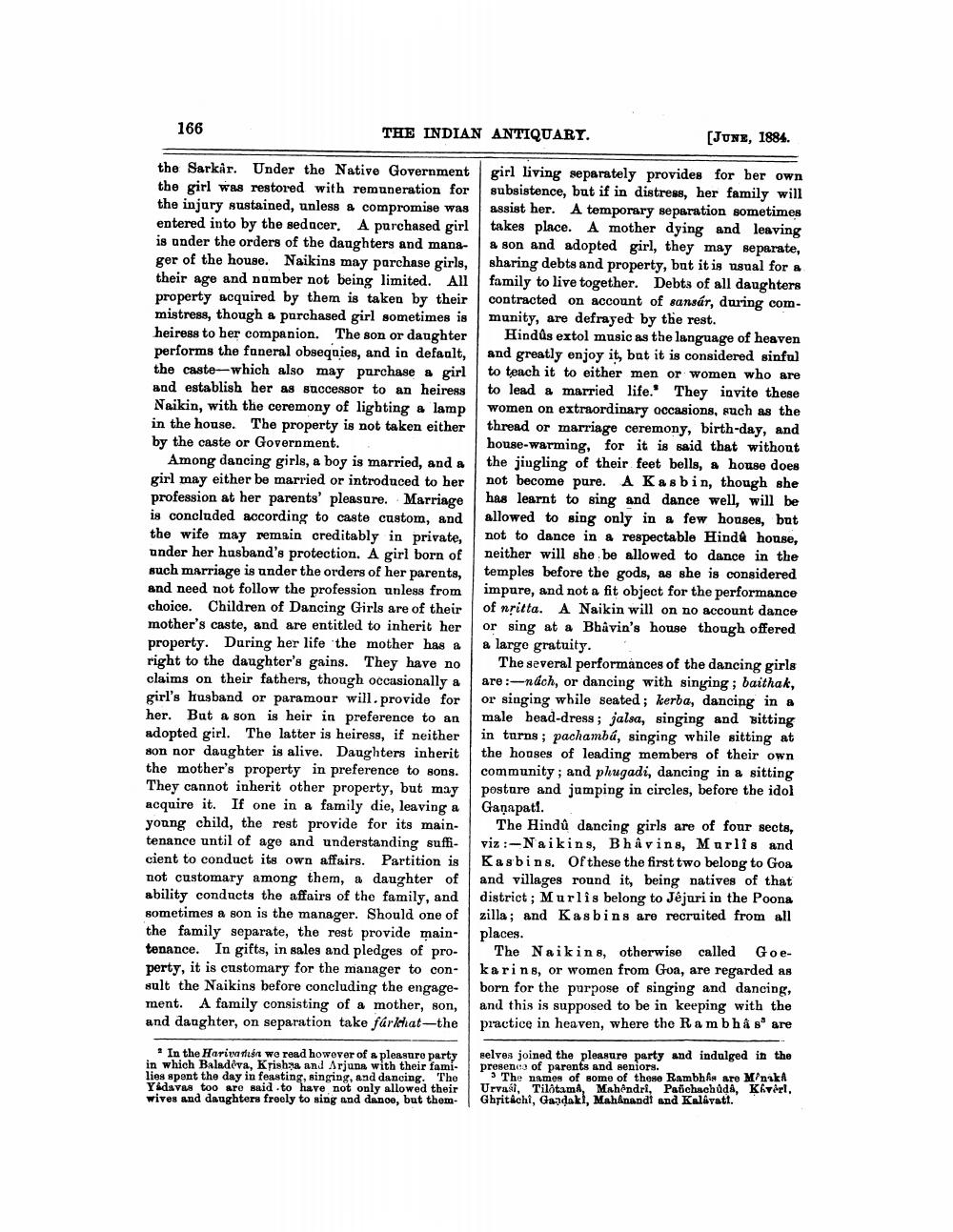________________
166
THE INDIAN ANTIQUARI.
(JUNE, 1884.
the Sarkar. Under the Native Government girl living separately provides for ber own the girl was restored with remuneration for subsistence, but if in distress, her family will the injury sustained, unless & compromise was assist her. A temporary separation sometimes entered into by the sedacer. A purchased girl takes place. A mother dying and leaving is under the orders of the daughters and mana- a son and adopted girl, they may separate, ger of the house. Naikins may parchase girls, sharing debts and property, but it is nsual for a their age and number not being limited. All family to live together. Debts of all daughters property acquired by them is taken by their contracted on account of sansár, during commistress, though a purchased girl sometimes is munity, are defrayed by the rest. heiress to her companion. The son or daughter Hindús extol music as the language of heaven performs the funeral obsequies, and in default, and greatly enjoy it, but it is considered sinful the caste-which also may purchase a girl to teach it to either men or women who are and establish her as successor to an heiress to lead a married life. They invite these Naikin, with the ceremony of lighting a lamp women on extraordinary occasions, such as the in the house. The property is not taken either thread or marriage ceremony, birth-day, and by the caste or Government.
house-warming, for it is said that without Among dancing girls, a boy is married, and a the jingling of their feet bells, a house does girl may either be married or introduced to her not become pare. A Kasbin, though she profession at her parents' pleasure. Marriage has learnt to sing and dance well, will be is concluded according to caste custom, and allowed to sing only in a few houses, but the wife may remain creditably in private, not to dance in a respectable Hinda house, under her husband's protection. A girl born of neither will she be allowed to dance in the such marriage is under the orders of her parents, temples before the gods, as she is considered and need not follow the profession unless from impure, and not a fit object for the performance choice. Children of Dancing Girls are of their of nritta. A Naikin will on no account dance mother's caste, and are entitled to inherit her or sing at a Bhavin's house though offered property. During her life the mother has a la large gratuity. right to the daughter's gains. They have no The several performances of the dancing girls claims on their fathers, though occasionally a are :-nách, or dancing with singing ; baithak, girl's husband or paramour will provide for or singing while seated; kerba, dancing in a her. But a son is heir in preference to an male head-dress; jalsa, singing and sitting adopted girl. The latter is heiress, if neither in turns; pachambú, singing while sitting at son nor daughter is alive. Daughters inherit the houses of leading members of their own the mother's property in preference to sons. community; and phugadi, dancing in a sitting They cannot inherit other property, but may posture and jumping in circles, before the idol acquire it. If one in a family die, leaving a Ganapati. young child, the rest provide for its main- The Hindu dancing girls are of four sects, tenance until of age and understanding suffi- viz:-Naikins, Bha vins, Marlis and cient to conduct its own affairs. Partition is Kasbins. Of these the first two belong to Goa not customary among them, a daughter of and villages round it, being natives of that ability conducts the affairs of the family, and district; Murlis belong to Jėjuri in the Poona sometimes a son is the manager. Should one of zilla; and Kasbins are recruited from all the family separate, the rest provide main- places. tenance. In gifts, in sales and pledges of pro- The Naikins, otherwise called Goeperty, it is customary for the manager to con- karins, or women from Goa, are regarded as sult the Naikins before concluding the engage- born for the purpose of singing and dancing, ment. A family consisting of a mother, son, and this is supposed to be in keeping with the and daughter, on separation take farlat-the practice in heaven, where the Rambha soare
. In the Hariven we read however of a pleasure party selves joined the pleasure party and indulged in the in which Baladeva, Krisha and Arjuna with their fami- presence of parents and seniors. lies apont the day in feasting, singing, and dancing. The The names of some of these Rambhs are Mnuk Y davas too are said to have not only allowed their Urvasi, Tilótama, Mahendri, Patchachůda, Kivel, wives and daughters freely to sing and dance, but them. Ghitachi, Gandakl, Mahinandi and Kalavatt.




